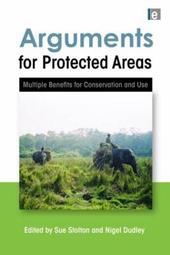
|
Arguments for Protected Areas: Multiple Benefits for Conservation and Use
Paperback
Main Details
| Title |
Arguments for Protected Areas: Multiple Benefits for Conservation and Use
|
| Authors and Contributors |
Edited by Nigel Dudley
|
|
Edited by Sue Stolton
|
| Physical Properties |
| Format:Paperback | | Pages:296 | | Dimensions(mm): Height 234,Width 156 |
|
| Category/Genre | Applied ecology
Conservation of the environment |
|---|
| ISBN/Barcode |
9781844078813
|
| Classifications | Dewey:333.72 |
|---|
| Audience | | Tertiary Education (US: College) | | Professional & Vocational | |
|---|
| Illustrations |
Photographs, maps, figures, tables, graphs, index
|
|
Publishing Details |
| Publisher |
Taylor & Francis Ltd
|
| Imprint |
Earthscan Ltd
|
| Publication Date |
19 March 2010 |
| Publication Country |
United Kingdom
|
Description
Most protected areas (e.g.national parks and nature reserves) have been created to protect wildlife and land- and seascape values. They currently cover over 13% of the world's land surface, around 12% of marine coastal areas and 4% of the marine shelf. Retaining and expanding these areas in the future will depend on showing their wider benefits for society. This book provides a concise and persuasive overview of the values of protected areas. Contributing authors from over fifty countries examine a wide range of values that are maintained in protected areas, including food, water and materials; health; tourism; cultural and spiritual values; and buffering capacity against climate change and natural disasters. The book also considers the role of protected areas in poverty reduction strategies, their relationship with traditional and indigenous people and in fostering conflict resolution through peace parks initiatives. The chapters draw on a series of authoritative reports published by WWF over recent years under the 'Arguments for Protection' banner, in association with various partners, and on additional research carried out especially for the volume. It analyses the opportunities and limitations of protected areas for supplying the various values along with practical advice for planners and managers about maximising benefits. It provides an important contribution to the debate about the role of protected areas in conservation and other aspects of natural resource management and human livelihoods. Published with WWF
Author Biography
Nigel Dudley of Equilbrium Research ,based in Bristol, UK, is an ecologist and consultant working on issues relating to forest conservation, protected areas and broad scale approaches to conservation, co-author with Rodolphe Shlaepfer, William Jackson, Jean-Paul Jeanrenaud and Sue Stolton of Forest Quality (2006) and co-editor with Sue Stolton of Partnerships for Protection (1999.) Sue Stolton, also of Equilibrium Research, specialises in issues relating to protected areas and the assessment of conservation actions.
Reviews'An honest appraisal of the many values and benefits of protected areas which shows why they are not just of interest to conservationists but also of critical importance to those who are as concerned with equity and sustainable development.' Nik Sekhran, Principal Technical Advisor for Ecosystems and Biodiversity, United Nations Development Programme 'In the future, national park agencies will be operating in a much more complex world. There is an urgent need to identity and quantify the wide range of environmental and economic benefits provided by protected areas. Being able to document the full range of benefits is a great challenge and is becoming an essential tool in order to provide tangible arguments for their conservation and partnership building. This book shows how by working together we can build a successful and inclusive parks system.' Julia Miranda Londoi? o, General Director, Parques Nacionales Naturales de Colombia 'I commend the editors and authors for this outstanding new book which describes arguments for the concept, establishment and effective management of protected areas and the benefits that arise. It is an essential tool for leaders and decision makers and will help achieve future conservation outcomes.' Dr Graeme L. Worboys, IUCN Vice Chair (Mountains and Connectivity Conservation), World Commission on Protected Areas
|